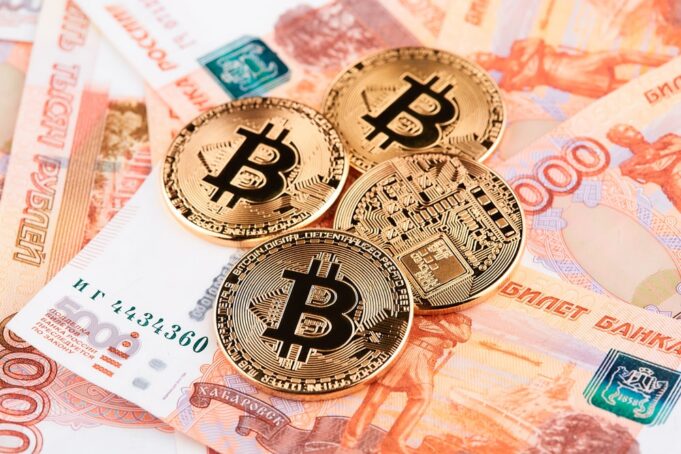In a bold move to counteract the impact of Western sanctions, Russia is launching two state-run cryptocurrency exchanges in Moscow and St. Petersburg. These platforms aim to facilitate international trade, particularly with BRICS nations, by offering an alternative to the U.S. dollar-dominated financial system. With these crypto exchanges, Russia hopes to circumvent the crippling effects of economic isolation and establish a new, independent financial framework that could reshape global financial dynamics.
A Strategic Shift in Response to Sanctions
The impetus behind Russia’s crypto exchange initiative is clear: Western sanctions have significantly disrupted the nation’s ability to conduct international trade using traditional financial systems. The sanctions, particularly those imposed by the United States and its allies, have isolated Russia from key global financial networks, including the SWIFT international banking system. This isolation has made it increasingly difficult for Russian companies to process payments for exports and imports. These circumstances drive the need for alternative solutions such as state-backed crypto exchanges.
In response, Russia has chosen to leverage blockchain technology and cryptocurrency to bypass these restrictions. The planned crypto exchanges in Moscow and St. Petersburg will operate under the strict oversight of the Central Bank of Russia. They will utilize the existing National Payment Card System (NPCS) to facilitate the conversion of rubles into digital currencies. Established in 2014, this system already plays a critical role in Russia’s domestic financial infrastructure. It manages the Mir payment card and interbank settlements.
Geopolitical Implications and BRICS Alignment
Russia’s cryptocurrency initiative is not just a response to sanctions; it is also a strategic maneuver aimed at challenging the global dominance of the U.S. dollar. By creating a parallel financial system that operates independently of Western-controlled networks, Russia aligns itself with BRICS nations – Brazil, Russia, India, China, and South Africa – in their broader effort to reduce reliance on the dollar in international trade.
This move could have significant geopolitical implications. If successful, it could encourage other nations facing similar economic pressures to adopt similar strategies, potentially leading to a more fragmented global financial system. The BRICS nations have long wanted to develop alternative finance systems, not subject to Western influence. Russia’s state-backed crypto exchanges could be a critical step in that direction.
Challenges and Uncertainties
Despite its ambitious goals, Russia’s crypto exchange gambit is not without challenges. Integrating cryptocurrency into a highly regulated global financial system involves legal and logistical hurdles. The Russian government has historically been wary of digital currencies. Regulatory bodies frequently debate the legality and potential risks associated with their use. While recent legislative changes have paved the way for this initiative, significant questions remain. How will these exchanges operate within the broader international regulatory framework?
Moreover, the success of these Russian crypto exchanges will largely depend on their ability to gain the trust and participation of international trading partners. The use of cryptocurrency in international trade is still a relatively untested concept on this scale. The potential for volatility and security risks could deter some nations from fully embracing the system. Additionally, the effectiveness of these exchanges in truly circumventing sanctions remains to be seen. Western powers may respond with further economic countermeasures.
>>> Read more: Russia’s Digital Ruble Pilot: Testing the Waters of Mass Adoption
A Potential Shift in Global Power Dynamics
Russia’s move to establish state-backed crypto exchanges represents a significant shift in its economic strategy. It could alter global power dynamics. By creating an alternative financial system, Russia’s crypto exchange initiative is not only seeking to mitigate the impact of sanctions but also to challenge the dominance of the U.S. dollar in international trade. If successful, this initiative may pave the way for other nations to follow suit, leading to a more multipolar global financial system.
As the world watches these developments unfold, the long-term implications of Russia’s crypto exchange strategy will likely be felt far beyond its borders. Whether this gamble will pay off remains uncertain, but it undoubtedly marks a new chapter in the ongoing evolution of global finance.
Readers’ frequently asked questions
What impact could Russia’s state-backed crypto exchanges have on the global financial system?
Russia’s move to establish state-backed cryptocurrency exchanges could have significant implications for the global financial system. By providing an alternative to the U.S. dollar-dominated system, these exchanges could weaken the dollar’s dominance in international trade, particularly among BRICS nations. If other countries facing similar economic pressures or sanctions follow Russia’s lead, it could lead to a more multipolar financial landscape. This shift could reduce the influence of Western financial institutions and potentially destabilize the current global economic order, as countries create parallel systems that bypass traditional financial networks like SWIFT. However, the success of this initiative largely depends on whether these exchanges can gain international trust and effectively manage the inherent risks of cryptocurrency transactions.
How might Western nations respond to Russia’s cryptocurrency strategy?
Western nations, particularly the United States and its allies, may respond to Russia’s cryptocurrency strategy with additional economic sanctions or by tightening existing regulations on digital currencies. They could target entities that engage with Russia’s state-backed crypto exchanges. That would make it difficult for these platforms to gain traction in the global market. There is also the possibility of enhanced scrutiny on cryptocurrency exchanges worldwide, as Western countries might seek to prevent the use of digital currencies to bypass sanctions. Additionally, Western financial institutions might accelerate their own adoption of blockchain technology and digital currencies to maintain their competitive edge and influence in global finance.
What challenges could Russia face in successfully implementing these crypto exchanges?
Russia could face several significant challenges in implementing its state-backed crypto exchanges. Firstly, there are legal and regulatory hurdles, both domestically and internationally. While Russia has recently passed legislation to support this initiative, integrating cryptocurrency into the global financial system is complex. It’s fraught with potential conflicts, especially with countries with stricter regulations on digital assets. Secondly, the volatility and security risks associated with cryptocurrencies could deter potential international partners from using these exchanges. Lastly, gaining the trust of global trading partners will be crucial, but challenging, given the relatively untested nature of cryptocurrency for large-scale international trade and the political risks involved. If these challenges are not effectively managed, Russia’s crypto exchanges may struggle to achieve their intended impact on global trade.
What Is In It For You? Action Items You Might Want to Consider
Capitalize on BRICS-Related Cryptocurrencies
As Russia’s state-backed exchanges aim to foster trade with BRICS nations, cryptocurrencies that are popular or increasingly adopted within these countries might see a spike in demand. Consider exploring digital currencies like Ripple (XRP) or other tokens being tested in cross-border transactions within this bloc. Position yourself early in these assets to potentially ride the wave of increased utilization in international trade.
Prepare for Increased Market Complexity with Advanced Trading Tools
As Russia’s crypto exchanges come online, the global crypto market could experience heightened complexity due to the influx of new participants and the introduction of different regulatory environments. Upgrade your trading toolkit by incorporating advanced analytics, bots, and AI-driven decision-making tools that can process large amounts of data across multiple exchanges quickly. This will help you navigate the potential volatility and capitalize on emerging trends before the broader market catches on.
Experiment with Arbitrage Opportunities
As Russia introduces new crypto exchanges, there may be price discrepancies between these new platforms and established global exchanges. Look out for arbitrage opportunities, where you can buy low on one exchange and sell high on another, taking advantage of the initial volatility and differing liquidity levels in these emerging markets.











[…] >>> Read more: Russia’s Crypto Exchanges to Counter Sanctions, Challenge Dollar […]